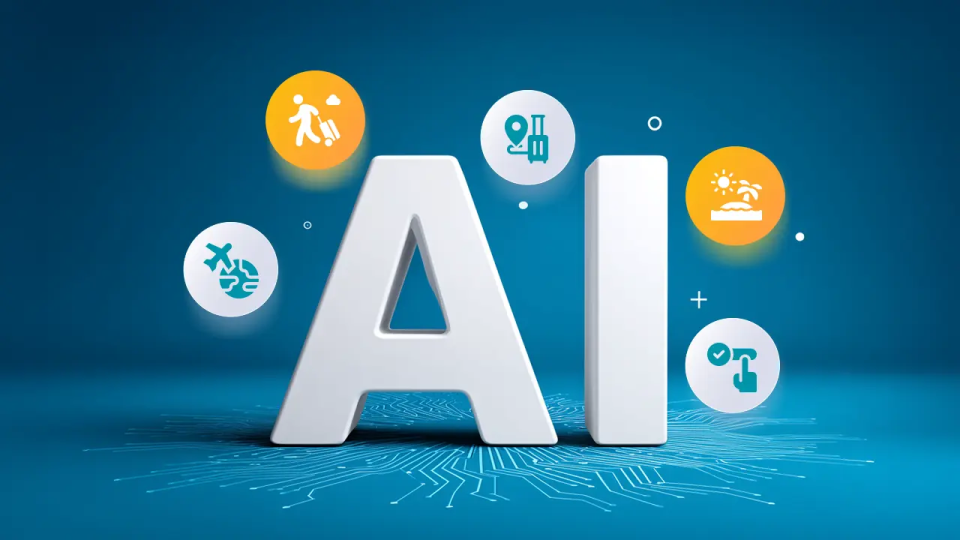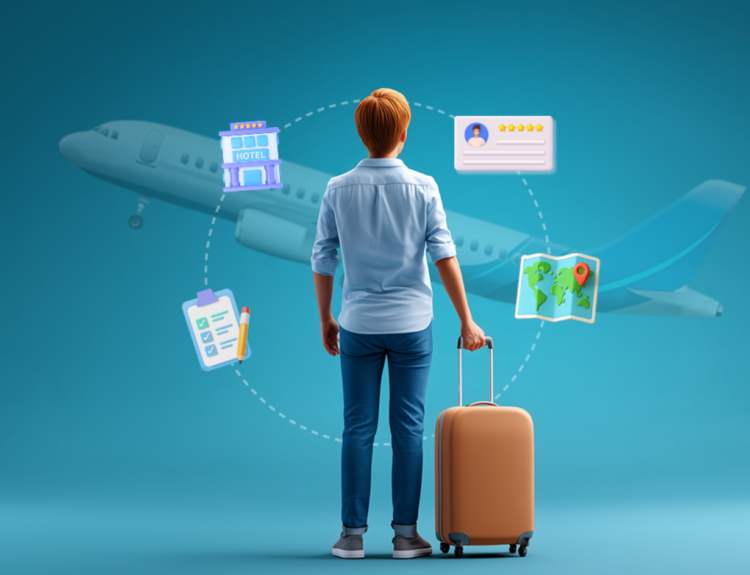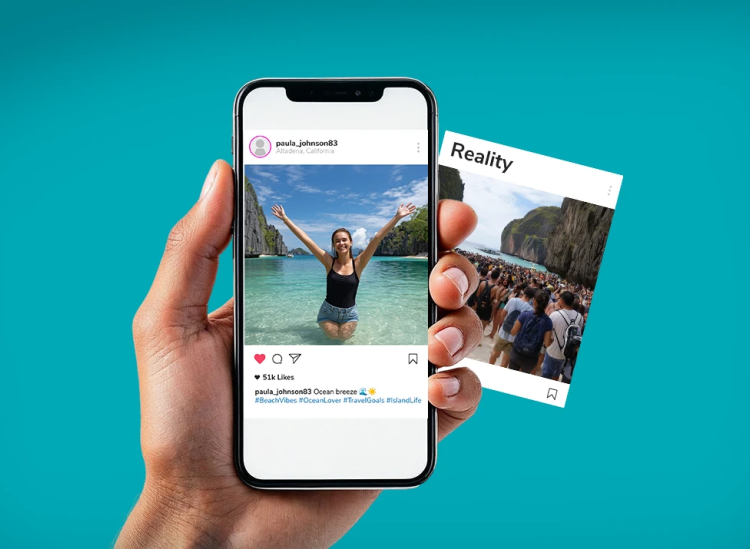Gone are those days when you need to spend hours dedicated to researching flights, comparing hotels, reading reviews, and creating itineraries. AI travel planning reflects a massive shift happening in how we approach travel. New research reveals the widespread adoption of AI in travel planning, with 70 per cent of Americans embracing the tech. Yet millions of travelers still suffer through the traditional marathon of endless browser tabs, conflicting reviews, and decision paralysis.
The problem is the overwhelming complexity of modern travel planning. With millions of accommodation options, thousands of airlines, countless activity choices, and prices that change very fast, traditional planning methods can leave you frustrated, overwhelmed, and often making suboptimal choices.
The AI Travel Planning Revolution
The statistics surrounding AI travel planning adoption are staggering. Recent industry research shows that travelers using AI-powered tools save an average of 12 hours during the planning process while discovering 34% more activities that match their interests. These travelers also report 23% higher satisfaction rates with their actual trips.
Booking.com, one of the world’s leading digital travel platforms, is expanding its AI-powered features to deliver more tailored and time-saving solutions for travelers, joining dozens of other platforms racing to integrate artificial intelligence into every aspect of trip planning.
The age demographics tell an interesting story about AI travel planning adoption. While 78% of Gen Z travelers actively use AI tools for trip planning, even 45% of Baby Boomers have experimented with these technologies. The appeal crosses generational lines because the benefits like time savings, personalization, and reduced stress.
AI Knows You Better Than You Know Yourself
Traditional travel planning forces you to sift through generic recommendations that might not match your preferences, budget, or travel style. AI flips this process entirely, learning from your choices and creating hyper-personalized experiences that evolve with each interaction.
AI tracks the types of accommodations you browse, the activities you save, the restaurants you research, and even how long you spend looking at different options. This data creates a detailed preference profile that becomes more accurate with each use.
The Speed Factor – From Weeks to Hours
What once required days of research now happens in minutes. AI tools can simultaneously search thousands of flight combinations, compare millions of accommodation options, and cross-reference countless activities to create optimized itineraries.
But speed without quality is worthless. The magic of AI lies in its ability to maintain and often improve planning quality while dramatically reducing time investment. These systems process vastly more information than humanly possible, considering factors like seasonal weather patterns, local events, crowd levels, and price trends that would take humans hours to research.
A recent case study followed 500 travelers comparing AI travel planning tools to traditional methods. The AI group averaged 3.2 hours of planning time versus 18.7 hours for traditional planners. Surprisingly, the AI group also reported fewer travel disruptions and higher overall satisfaction, suggesting that faster planning actually led to better trips.
The Budget Optimization
AI travel planning excels at something humans struggle with and that is complex optimization across multiple variables. Traditional planning often involves choosing between different aspects like cheaper flights versus better timing, luxury accommodation versus more activities. AI tools can analyze thousands of combinations to find solutions that maximize value across all dimensions.
These systems track price patterns, predict future changes, and identify optimal booking windows with near perfect accuracy.
AI tools can redistribute spending to maximize experience value, perhaps suggesting a slightly more expensive hotel in exchange for savings on transportation that results in a much better overall trip experience.
Real-Time Adaptation and When Plans Meet Reality
Traditional travel planning creates static itineraries that crumble the moment reality intervenes. Flight delays, weather changes, unexpected closures, or simply discovering you hate the restaurant you researched for months can derail carefully laid plans.
AI excel at real-time adaptation. These systems monitor conditions continuously and can instantly reorganize entire itineraries around disruptions. More impressively, they learn from these changes to make better initial recommendations for future trips.
The Language Barrier Breakthrough
International travel planning traditionally required navigating foreign language websites, translating reviews, and deciphering local customs. AI travel planning tools break down these barriers by providing real-time translation, cultural context, and localized insights that make international planning accessible to anyone.
An AI travel planning tool might know that dinner reservations in Spain should be made for 9 PM or later, or that certain attractions in Japan require advance booking through specific local platforms.
For travelers venturing beyond their linguistic comfort zones, AI tools serve as cultural interpreters, helping navigate not just language differences but social customs, tipping practices, and local etiquette that can make or break travel experiences.
The Hidden Gem Discovery Engine
One of the most exciting aspects of AI travel planning is its ability to uncover experiences that traditional methods miss entirely. These systems analyze vast amounts of data from social media posts, local reviews, event calendars, weather patterns to identify opportunities that don’t appear in mainstream travel guides.
AI tools have introduced travelers to underground jazz clubs in Prague, hidden beaches in Greece, and local festivals in small towns that become trip highlights. The discovery happens through sophisticated pattern recognition that identifies experiences matching individual preferences rather than relying on generic popularity rankings.
The Group Travel Coordination
Anyone who’s tried to plan a group trip knows the nightmare of coordinating multiple schedules, preferences, and budgets. AI travel planning tools are revolutionizing group travel by finding solutions that satisfy everyone’s constraints while maximizing collective satisfaction.
These systems can analyze the vacation days, budget ranges, activity preferences, and travel style of multiple people to identify options that work for the entire group. What once required weeks of negotiation and compromise now happens through algorithmic optimization that considers everyone’s needs simultaneously.
The Accessibility Revolution
AI travel planning is transforming travel accessibility by identifying and accommodating specific needs that traditional planning often overlooks. These systems can filter accommodations for wheelchair accessibility, identify restaurants with specific dietary options, and plan routes that accommodate mobility limitations.
The impact extends beyond physical accessibility to include sensory considerations, budget constraints, and cultural accommodations. AI tools can create itineraries that avoid crowded spaces for travelers with anxiety, identify quiet accommodations for light sleepers, or plan routes that minimize walking for those with mobility challenges.
This personalization makes travel accessible to people who might otherwise feel excluded from traditional tourism, opening opportunities for adventure and exploration that were previously difficult to navigate.
The Trust and Privacy Challenge
Despite the obvious benefits, AI travel planning faces legitimate concerns about privacy, data security, and algorithmic bias. These systems require access to personal information like spending patterns, location preferences, social connections, that raises important questions about data protection and usage.
The most reputable AI travel planning platforms address these concerns through transparent privacy policies, data encryption, and user control over information sharing. However, travelers should understand what data they’re sharing and how it’s being used to make informed decisions about which platforms to trust.
The Future Trajectory and What’s Coming Next
The current state of AI travel planning represents just the beginning of a technological revolution that will continue transforming how we explore the world. Emerging developments include virtual reality destination previews, predictive rebooking for disruptions, and integration with smart city infrastructure for seamless local navigation.
The next generation of travel planning will likely include voice-controlled planning, augmented reality navigation, and predictive recommendations that anticipate needs before travelers even realize them. The goal isn’t to remove human agency from travel but to eliminate friction and maximize the time spent enjoying experiences rather than planning them.
Practical Steps for AI Travel Planning
The most effective approach combines AI efficiency with human judgment, using technology to handle research and optimization while maintaining personal decision-making control.
Start by experimenting with AI travel tools for smaller trips or specific aspects of larger trips. Many platforms offer free tiers that allow testing without commitment. Pay attention to how well the recommendations match your preferences and adjust your input accordingly.
The learning curve for AI travel planning is generally minimal, but maximizing benefits requires understanding how to communicate effectively with these systems. Provide detailed preference information, be specific about constraints and priorities, and don’t hesitate to refine recommendations until they match your vision.
Ready For Your AI-Assisted Travel Plan?
As technology continues evolving, these benefits will only increase, making AI travel planning not just a convenient option but an essential tool for modern travelers.
The choice isn’t between human intuition and artificial intelligence. It’s between struggling with outdated planning methods and embracing tools that amplify human decision-making with computational power. Your next great travel experience might be just one AI recommendation away.









